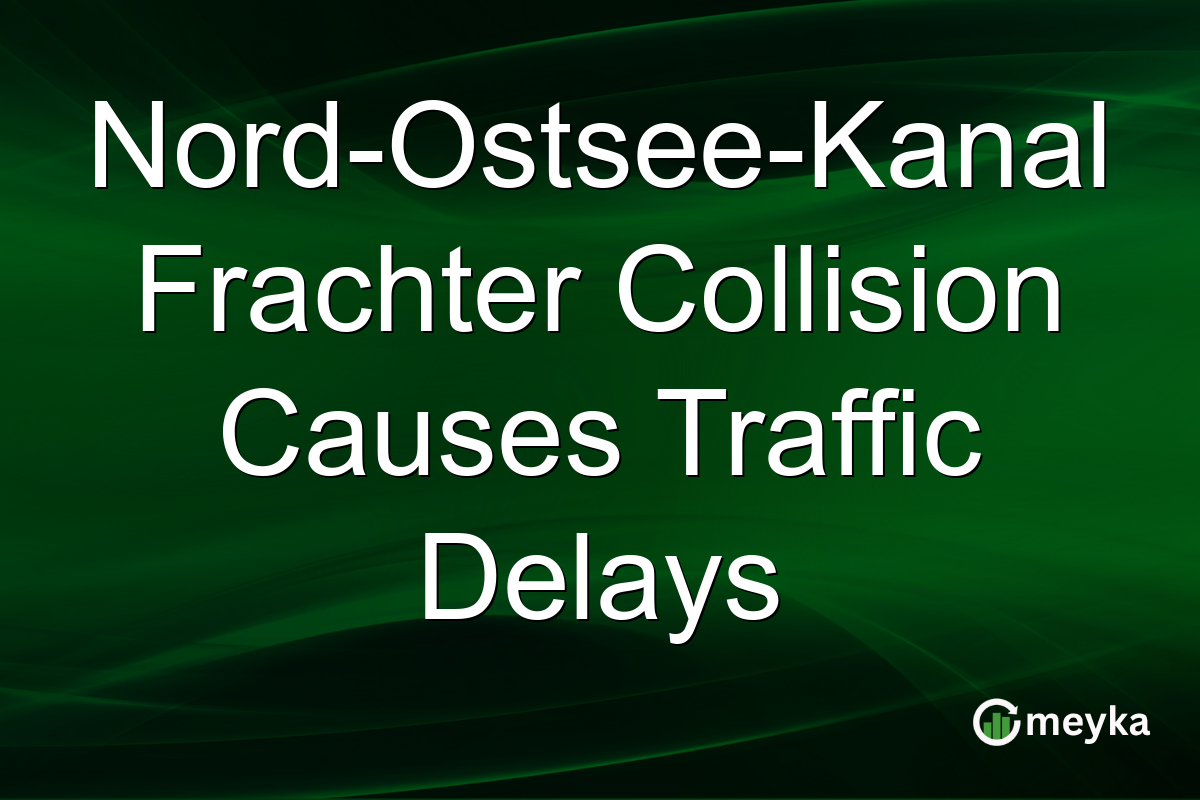Nord-Ostsee-Kanal Frachter Collision Causes Traffic Delays
A significant incident occurred on the Nord-Ostsee-Kanal, where a cargo ship collided with a lock gate near Brunsbüttel. This accident has caused substantial damage and poses potential disruptions to maritime traffic along this crucial waterway. The Nord-Ostsee-Kanal, a vital route connecting the North Sea and the Baltic Sea, often termed the “Kiel Canal,” now faces challenges in maintaining its traffic flow.
The Brunsbüttel Locks Accident
The incident at the Brunsbüttel locks involves a cargo ship impacting one of the lock gates. This collision led to severe structural damage and has rendered the lock chamber temporarily inoperative. According to reports from local authorities, the collision occurred due to adverse weather conditions, emphasizing the canal’s vulnerability during harsh climatic events. This accident brings attention to safety measures required for such infrastructure. The economic implications of the accident are noteworthy. The Nord-Ostsee-Kanal is a major maritime passage, with approximately 30,000 vessels using it annually. This incident could limit the capacity of ships passing through, affecting shipping schedules and potentially leading to economic losses for industries reliant on this route. Authorities are actively working to assess the damage and expedite repairs, but delays could extend if complications arise. Further details on the accident and repairs can be found on Tagesschau.
Impact on Shipping Traffic
The collision’s immediate effect on the Nord-Ostsee-Kanal’s traffic is significant. With one of the critical lock chambers at Brunsbüttel out of operation, congestion is expected. Ships may need to reroute or face prolonged waiting times. This situation not only affects cargo schedules but also raises logistical costs for shipping companies. Given the canal’s strategic importance, the ripple effect might extend beyond local shipping lines. International trade lanes that rely on this shortcut between the North and Baltic Seas could see scheduling upheavals. Alternative routes, such as around the Danish Peninsula, increase travel time and fuel consumption, thereby raising operational costs. For more on the traffic delays visit n-tv.
Economic and Environmental Considerations
The economic impact of the collision at Brunsbüttel extends further than just delayed shipments. Companies facing prolonged disruptions will likely experience financial strain. The shipping industry, already battling tight margins, may face increased costs as they adjust logistics and schedules. Environmental concerns also arise from such incidents. Each delay or route diversion results in additional fuel use, which increases carbon footprints. It highlights the delicate balance between maintaining critical infrastructure and protecting the environment. Incidents like these emphasize the need for robust planning and timely interventions to prevent future mishaps. Innovative solutions such as adopting AI-driven maritime technologies could enhance navigational safety. Investing in predictive analytics to foresee potential risks might reduce accidents, securing both economic and environmental interests in the long term.
Future Outlook and Preparations
Despite the recent setback, the importance of the Nord-Ostsee-Kanal remains undisputed. Its role as a facilitator of international trade ensures that it will continue receiving attention and investment. The prioritization of repairs at Brunsbüttel indicates the urgency with which authorities want to restore full operation. Looking ahead, advancements in technology and improved maritime regulations could bolster safety measures. The introduction of real-time monitoring and automated systems might help in better management of lock operations, reducing the likelihood of such collisions. Platforms like Meyka could greatly assist investors and industry players in monitoring such events and making informed decisions. With its real-time analytics and comprehensive market insights, Meyka offers valuable resources for understanding the broader implications of incidents like the Nord-Ostsee-Kanal collision.
Final Thoughts
The collision at the Nord-Ostsee-Kanal serves as a reminder of the complexities involved in maritime logistics and infrastructure management. As authorities work to repair the damage and reduce traffic disruptions, the need for enhanced safety measures and strategic planning becomes clear. With advancements in technology and platforms like Meyka providing real-time insights, stakeholders can better navigate challenges and opportunities in global trade.
FAQs
The collision was attributed to adverse weather conditions impacting the cargo ship’s navigation, leading to a crash into the lock gate at Brunsbüttel.
The accident causes delays and congestion as one of the canal’s lock chambers is out of operation, potentially leading ships to reroute or face prolonged waiting times.
Delays could increase logistical costs for shipping companies, and industries relying on the canal might face economic losses due to disrupted schedules.
Disclaimer:
This is for information only, not financial advice. Always do your research.






